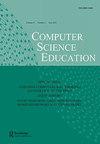为了不改变而改变:极端正统的哈西德派女性学习计算机科学的经历
IF 2.2
Q1 EDUCATION & EDUCATIONAL RESEARCH
引用次数: 1
摘要
背景与背景与招募代表性不足的群体参与计算机科学研究的兴趣一致,我们的研究涉及在学术机构成功学习计算机科学的以色列哈西德派年轻女性。目的研究影响哈西德派年轻女性参加计算机科学课程的因素,以及影响她们学习经历的因素。方法对10名大四学生进行访谈,了解他们学习计算机科学的决定和他们的经历,然后对所有学生进行问卷调查。我们将哈西德派学生的成绩与相同课程的其他女学生的成绩进行了比较。重复测量方差分析使我们能够根据其对参与者的重要性对因素进行排序。虽然经济地位是一个强大的激励因素,但选择特定的课程是由于学生希望被社会孤立。学生们经常因为与外界的接触而分心。然而,尽管她们经济困难,知识差距很大,但她们的学术成就与其他女性群体相似。这个群体在决定参加计算机科学课程的因素方面是独一无二的。尝试扩大计算机科学学生的多样性将受益于了解代表性不足的群体的独特背景。本文章由计算机程序翻译,如有差异,请以英文原文为准。
Change in order not to change: ultraorthodox hasidic women’s experience in studying computer science
ABSTRACT Background and Context In line with interest in recruiting underrepresented groups to CS studies, our study dealt with Israeli Hasidic young women who successfully studied CS at an academic institute. Objective We investigated what factors governed Hasidic young women’s decision to enrol in a CS program and shaped their studying experience. Method Interviews with 10 final-year students on their decision to study CS and their experience of it, were followed by a questionnaire administrated to all the students in the programme. We compared the Hasidic students’ grades to other female students in identical programs. Repeated measures ANOVA enabled us to rank the factors according to their importance to the participants. Findings While economic status was a powerful motivating factor, the specific programme was chosen due students’ desire to be socially isolated. Students were constantly distracted by encounters with the outside world. Nevertheless, and despite their economic difficulties and wide knowledge gaps, their academic achievements were similar to those of other female groups. Implications This group was unique in terms of the factors underlying their decision to enrol in a CS program. Attempts to expand the diversity of CS students would benefit from understanding the unique context of the underrepresented group.
求助全文
通过发布文献求助,成功后即可免费获取论文全文。
去求助
来源期刊

Computer Science Education
EDUCATION & EDUCATIONAL RESEARCH-
CiteScore
6.90
自引率
3.70%
发文量
23
期刊介绍:
Computer Science Education publishes high-quality papers with a specific focus on teaching and learning within the computing discipline. The journal seeks novel contributions that are accessible and of interest to researchers and practitioners alike. We invite work with learners of all ages and across both classroom and out-of-classroom learning contexts.
 求助内容:
求助内容: 应助结果提醒方式:
应助结果提醒方式:


